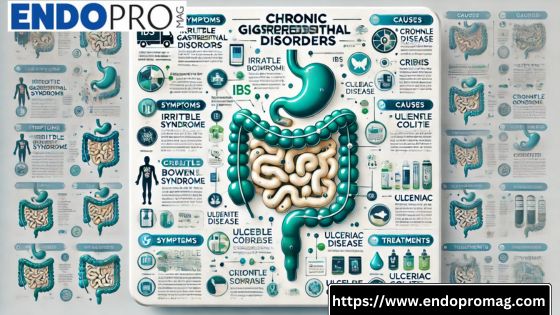Chronic gastrointestinal (GI) disorders affect millions of people worldwide, causing discomfort, pain, and disruptions in daily life. These conditions range from irritable bowel syndrome (IBS) and Crohn’s disease to acid reflux and Chronic Gastrointestinal Disorders. Understanding their causes, symptoms, and effective management strategies is essential for maintaining digestive health.
Endopromag is committed to providing effective solutions for managing chronic GI disorders. With innovative treatments and expert guidance, Endopromag ensures patients receive the care they need for long-term relief.
Common Chronic Gastrointestinal Disorders
Several GI disorders persist over time, leading to chronic symptoms. Below are some of the most common conditions:
1. Irritable Bowel Syndrome (IBS)
IBS is a functional digestive disorder characterized by:
- Abdominal pain
- Bloating
- Diarrhea or constipation
- Excessive gas
The exact cause of IBS is unclear, but it is linked to stress, diet, and abnormal gut motility.
2. Gastroesophageal Reflux Disease (GERD)
GERD occurs when stomach acid frequently flows back into the esophagus, causing symptoms such as:
- Heartburn
- Chest pain
- Difficulty swallowing
- Chronic cough
Lifestyle changes and medications can help manage GERD effectively.
3. Inflammatory Bowel Disease (IBD)
IBD includes Crohn disease and ulcerative colitis, both of which involve chronic inflammation of the digestive tract. Symptoms include:
- Severe diarrhea
- Fatigue
- Weight loss
- Abdominal pain
IBD can lead to complications such as malnutrition and intestinal damage.
4. Chronic Gastritis
Chronic gastritis is the prolonged inflammation of the stomach lining, often caused by:
- Helicobacter pylori (H. pylori) infection
- Long-term use of NSAIDs
- Excessive alcohol consumption
- Symptoms include nausea, bloating, and indigestion.
5. Celiac Disease
Celiac disease is an autoimmune disorder where the ingestion of gluten triggers an immune response that damages the small intestine. Symptoms include:
- Diarrhea
- Fatigue
- Weight loss
- Anemia
The only treatment for celiac disease is a strict gluten-free diet.
6. Peptic Ulcer Disease
Peptic ulcers are open sores in the stomach lining or the upper part of the small intestine. They are mainly caused by:
- H. pylori infection
- Prolonged NSAID use
- Excess stomach acid
- Symptoms include burning stomach pain, nausea, and bloating.
7. Chronic Constipation
Chronic constipation affects normal bowel movements, leading to:
- Hard, dry stools
- Infrequent bowel movements
- Straining during defecation
It is commonly caused by a low-fiber diet, dehydration, and a sedentary lifestyle.
Causes of Chronic GI Disorders
Chronic gastrointestinal disorders can be triggered by various factors, including:
Dietary Choices:
Excessive consumption of fatty, spicy, and processed foods can irritate the digestive tract.
Infections:
Bacterial, viral, and parasitic infections can cause long-term digestive problems.
Genetics:
Some GI conditions, like Crohn’s disease and celiac disease, have a hereditary component.
Stress and Anxiety:
Psychological stress can worsen IBS and GERD symptoms.
Medications:
Overuse of NSAIDs, antibiotics, and certain painkillers can damage the stomach lining.
Autoimmune Disorders:
Conditions like celiac disease and IBD result from an abnormal immune response.
Symptoms of Chronic GI Disorders
The symptoms of chronic GI disorders vary depending on the condition but commonly include:
- Persistent abdominal pain
- Bloating and gas
- Nausea and vomiting
- Changes in bowel habits (diarrhea, constipation)
- Unintentional weight loss
- Fatigue
- Heartburn and acid reflux
Diagnosis of Chronic GI Disorders
Early diagnosis is crucial for effective treatment. Common diagnostic methods include:
Endoscopy and Colonoscopy:
Used to examine the stomach, intestines, and esophagus.
Blood Tests:
Detect infections, inflammation, and nutritional deficiencies.
Stool Tests:
Identify infections and digestive enzyme deficiencies.
Imaging Scans:
CT scans and MRIs help detect abnormalities in the digestive tract.
Breath Tests:
Used to diagnose lactose intolerance and H. pylori infections.
Management and Treatment Options
1. Dietary Modifications
Increase Fiber Intake: Helps regulate bowel movements and prevent constipation.
Reduce Fatty and Spicy Foods: Lowers the risk of acid reflux and gastritis.
Stay Hydrated: Prevents dehydration and aids digestion.
Probiotics: Support gut health by promoting beneficial bacteria.
Avoid Trigger Foods: Identify and eliminate foods that worsen symptoms.
2. Medications
Antacids and Proton Pump Inhibitors (PPIs): Reduce stomach acid for GERD and ulcers.
Anti-inflammatory Drugs: Manage IBD symptoms.
Laxatives and Stool Softeners: Treat chronic constipation.
Antispasmodics: Relieve IBS-related abdominal pain.
Antibiotics: Treat H. pylori infections.
3. Lifestyle Changes
Regular Exercise: Helps improve digestion and reduce stress.
Stress Management: Meditation, yoga, and relaxation techniques can prevent symptom flare-ups.
Adequate Sleep: Supports overall gut health.
Avoid Smoking and Alcohol: Reduces the risk of acid reflux, ulcers, and gastritis.
4. Alternative Therapies
Acupuncture: May relieve symptoms of IBS and acid reflux.
Herbal Remedies: Peppermint oil, ginger, and chamomile can soothe digestive issues.
5. Surgical Interventions
In severe cases, surgery may be necessary, such as:
Bowel Resection: For Crohn disease and ulcerative colitis.
Fundoplication: For severe GERD cases.
Gallbladder Removal: For chronic gallstones affecting digestion.
Endopromag: You’re Partner in Digestive Health
At Endopromag, we prioritize digestive health by offering innovative treatments and expert advice. Our solutions help manage chronic GI disorders effectively, improving quality of life. Whether through advanced medications, dietary support, or lifestyle recommendations, Endopromag is committed to guiding patients toward long-term relief.
Chronic gastrointestinal disorders can significantly impact daily life, but with the right management strategies, they can be controlled. Understanding the causes, symptoms, and treatment options is key to maintaining a healthy digestive system.
With Endopromag, patients receive the best care and support to navigate their digestive health journey. If you experience persistent GI symptoms, consult a healthcare professional and explore solutions with Endopromag for a healthier, symptom-free life.


